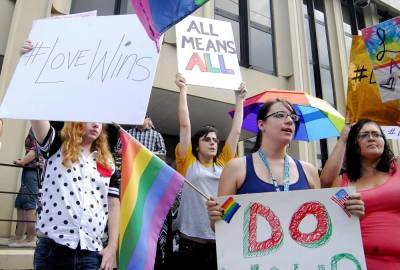How to minister to the LGBT community: Wesley's Quadrilateral as a guide

How can we as Christians minister and carry the gospel to the LGBT community? Let us consider this difficult issue, which centers around gender, homosexuality, gay marriage, and past hurts through the lenses of Wesley's Quadrilateral. The quadrilateral is a time tested tool for discerning difficult issues from a multi-pronged approach.
First of all, let's consider the pressures within the churches right now regarding theology, and the desire to change theology to embrace gay marriage. This is a present issue for many faith traditions in the west at this point in history. There are several faith traditions that have flipped their positions on gay marriage, such as the PCUSA (Presbyterians), the ELCA (Lutherans), and the MCGB (Methodists). Many other faith movements are beginning to appear weak in the knees as well, such as UMC, Salvation Army, the SBC, and others. What should I, as one single pastor in training do in regard to this issue? Should I speak out? Should I remain quiet? What is the proper position on this issue?
So I turn to the Wesleyan quadrilateral. The first question I ask is what do the scriptures say on the issue? Well, the scriptures say that all people are created in God’s image (Genesis 1:27 NIV). The word says that Christians should treat people with kindness, dignity, respect, and love (Matthew 5:43-48 NIV). And it also says that the message of salvation is open to all who would repent and believe in Jesus Christ (Mark 1:15 NIV). Additionally, the scriptures are clear that the practice of homosexuality is contrary to New Testament teachings (1 Corinthians 6:9-11, Romans 1:26-27, 1 Timothy 1:10 NIV). There have been attempts by individuals like Matthew Vines and Andrew Marin to somehow re-interpret and shift the meaning of the New testament scriptures regarding homosexuality, however, those attempts to re-interpret the scriptures falter in a fair reading of the biblical texts (Brown, 2015). A plain reading of the New Testament makes this abundantly clear.
Next, I consider tradition. For the past two thousand years virtually every faith tradition has considered homosexuality a sinful practice. Sadly, many of these faith traditions mistreated those who struggle with the sin of homosexuality, especially in the last one hundred years in the United States and Europe. This means that I need to be especially careful to treat these individuals with compassion, dignity, and love. The church’s historic tradition has been to affirm marriage between man and woman, and homosexuality is a sinful practice, but those who struggle with that sin should be treated with love, kindness, and dignity. Those who struggle with this sin, like any other, must repent, by abstaining from the practice. But "conversion" to attraction to the opposite sex is not necessarily possible.
From the area of reason there is a great deal of debate and speculation, much of it propaganda, from both the spirit of the age and from the church. But research does show increased health risks for men practicing homosexuality (Mayo Clinic Staff, 2017). Reason also shows me that there is a great deal of controversy and apostasy around this issue in the world and the church. So I must tread exceedingly carefully. Additionally, I see that many in the LGBTQ movements have placed their very identity in their sexuality, and so I see that I should help these people to see human identity is not found in sexuality, but in Jesus Christ.
Finally, experience shows me that many people of the homosexual persuasion feel marginalized and hurt by the church. So I must reach out to them in a kind, loving way, and avoid condemnation, while also encouraging repentance from sin, over time. Experience shows me that having relationships and friendships with people of this persuasion is useful. Experience has also taught me that there is a lot of misunderstanding from the LGBTQ community toward the church. For that, experience tells me I must make use of apologetics to help these people understand the love we have for them, and the truth we expound from the scriptures.
So now we turn to the experience I had. I was preaching at a church facility and among other sins that I was preaching about, homosexuality had come up as a topic to briefly discuss. I faced the temptation of being silent. I also faced the temptation to be overly harsh about it. I tried instead to be assertive. I preached about it and I tried to make sure it was understood that this sin was no different than many other sins that can afflict Christians. Afterward, I realized that perhaps some of the men struggle with that very sin, who were in the congregation. In the hallway on my way to dinner I noticed a man I’ve encountered several times at the facility, and I realized that he was most likely a homosexual person. I nodded and smiled to him as he walked by. Later in the dining room I made a point of sitting at the same table as him, and I simply engaged in friendly conversation with him. I wanted my actions and conduct to show that I didn’t hate him, or want to kick him out or hurt him. I tried to show indirectly, through love and fellowship that I love him and think of him with dignity as a person made in God’s image. I also hope that the message I gave in the chapel will stay with him, in hope that he will repent over time, and give himself in fullness to the mercy found in Jesus Christ, and live a new lifestyle of purity in Christ.
Another experience I had was about two months ago in Chicago, IL. I live at a seminary school right now that is in the midst of “boy’s town” an LGBTQ neighborhood. I went out to do evangelism with people in the neighborhood from 3:00 AM to 5:00 AM with another student on a Saturday. We set up a table and chairs, and people would walk by and sit down and talk with us. 99% of them were practicing homosexuals. So we would talk with them, about God, and often they would say to us: “Why are you out here, doesn’t the church hate gays?” And our answer was always to look back at them with surprise and say: “No, not at all! We love you.” So we seek to do healing through that, and show these people that God loves them and wants to save them from all their sins. This is now a common attitude in the church. We sat out there talking with various people for two hours. One man who sat there the whole two hours talking with us, had refused to take a gospel of John book, but at 5:00 AM he changed his mind, because he realized that we loved him. This is how evangelism to the homosexual community should be done, with love.
Sadly, there are some in my faith movement who want to go further than this, much further. They seek to redefine marriage, to redefine the sacred scriptures, and to change the historic views of our church movement on marriage, to fully embrace and affirm gay marriage, homosexuality, and gender ideology as a positive good. This is a troubling development. And there is a lot of misinformation out there.
So I write, and share the truth, and try to equip people in our movement to outreach to the gay community, but also to stand firm on the unchanging truth of the scriptures. Given scripture, tradition, reason, and experience, there is no other pathway forward. We want to be loving, in Christ, but it’s not loving to encourage people to continue in their sin. That is the opposite of love, it is hatred. Therefore, the best pathway forward, is to strongly affirm the biblical definition of marriage, while reaching out to the homosexual/LGBTQ community with great compassion, love, kindness, and dignity. Hatred is unacceptable, either through bigotry toward the lost or through encouraging the sin. Jesus came full of grace and truth, and we as a church movement have to find a way to live that out (John 1:14 NIV).



























